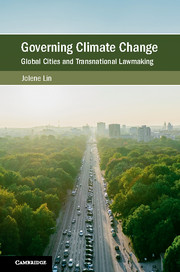Book contents
- Governing Climate Change
- Cambridge Studies on Environment, Energy and Natural Resources Governance
- Governing Climate Change
- Copyright page
- Contents
- Acknowledgements
- Abbreviations
- 1 Global Cities, Climate Change, and Transnational Lawmaking
- 2 Theoretical Framework
- 3 The Rise of the City in International Affairs
- 4 City Action on Climate Change
- 5 Transnational Urban Climate Governance via Networks: The Case of C40
- 6 Cities as Transnational Lawmakers
- 7 A Normative Assessment of Urban Climate Law
- 8 Conclusion
- Select Bibliography
- Index
1 - Global Cities, Climate Change, and Transnational Lawmaking
Published online by Cambridge University Press: 04 June 2018
- Governing Climate Change
- Cambridge Studies on Environment, Energy and Natural Resources Governance
- Governing Climate Change
- Copyright page
- Contents
- Acknowledgements
- Abbreviations
- 1 Global Cities, Climate Change, and Transnational Lawmaking
- 2 Theoretical Framework
- 3 The Rise of the City in International Affairs
- 4 City Action on Climate Change
- 5 Transnational Urban Climate Governance via Networks: The Case of C40
- 6 Cities as Transnational Lawmakers
- 7 A Normative Assessment of Urban Climate Law
- 8 Conclusion
- Select Bibliography
- Index
Summary
INTRODUCTION
On 12 December 2015, when French Foreign Minister Laurent Fabius announced that a new climate change agreement had been signed, cheers erupted in the negotiation hall and elsewhere around the world. States had finally concluded more than two decades of difficult multilateral negotiations. However, there should be no illusions that we are on track to averting dangerous human interference with the climate system. As noted ‘with concern’ in the Paris decision, based on the mitigation pledges that states submitted in advance of the Conference of the Parties (COP) in Paris, global greenhouse gas (GHG) emission levels will reach 55 gigatonnes in 2030. This far exceeds the 40 gigatonne limit necessary to hold the increase in the global average temperature to below 2 °C above pre-industrial levels. While the Paris Agreement requires states to progressively ratchet up their climate mitigation targets, it would not be wise to rely on states alone to address climate change. Solving a complex problem in a complex global society will require action beyond what states can shoulder. Tackling climate change requires pragmatic deliberation involving multiple sources of knowledge and experience, not simply the top-down involvement of ‘increasingly detached and under-resourced diplomats paralyzed by geopolitical power plays, hidden value systems, or zero-sum distributional calculations’.
While government delegates were in marathon negotiating sessions trying to conclude the Paris Agreement, banks, corporations, think tanks, consultancies, and various other organizations were holding ‘side events’ at multiple venues across Paris. At the Climate Summit for Local Leaders, mayors from around the world gathered to discuss climate change and to highlight the significant role that cities play in reducingGHG emissions and increasing society's resilience to the impacts of climate change. At the end of the summit, the city leaders delivered a declaration intended to ‘demonstrate their global leadership on climate policies’. Mayors who signed the Paris City Hall Declaration undertook commitments to ‘[a]dvance and exceed the expected goals of the 2015 Paris Agreement’ and ‘deliver up to 3.7 gigatons of urban [GHG] emissions reductions annually by 2030 – the equivalent of up to 30 per cent of the difference between current national commitments and the 2 degree emissions reduction pathway identified by the scientific community’. Following the Paris City Hall Declaration, the Lima-Paris Action Agenda (Focus on Cities) proposed a Five Year Vision to accelerate climate action in cities.
- Type
- Chapter
- Information
- Governing Climate ChangeGlobal Cities and Transnational Lawmaking, pp. 1 - 20Publisher: Cambridge University PressPrint publication year: 2018
- 1
- Cited by

